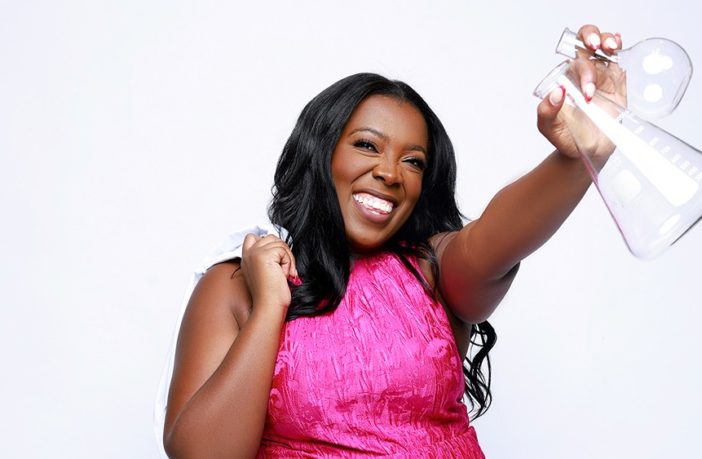Impact—simply put—evokes change. Organizations like State Farm® play a crucial role in creating positive impact within communities by providing support and resources that help accelerate ideas into streamlined operations. With all of this in mind, the lack of representation in different spaces leaves certain groups behind; in this case, Black female youth in the sciences.
The NSF says that men make up three-fourths of the skilled technical workforce. In consideration of those stats and with a passion to foster STEM education for little girls, Prairie View A&M graduate Kristen Wells-Collins took it upon herself to apply her degree in chemistry to fill in the gaps.
Wells-Collins launched Black to the Lab in 2020; a STEM educational learning kit that breaks down some basic cosmetic products and allows the user to create their own. The kit is also the basis for her science and entrepreneurial curriculums she teaches when she and her team travel to different schools.
“When we think of cosmetics, people automatically think of makeup… so, when we start our sessions, we start by asking the kids, ‘What did you use this morning, what did you brush your teeth with; what did you wash your hair with.’”
According to the Pew Research Center, a major reason for this underrepresentation is because Blacks (and Hispanics) are less likely to have access to quality education that prepares them for these fields. “It’s the lack of quality resources in some of the schools and school districts and it is no fault of their own. I think a part of it also is parent involvement.”
Wells-Collins’ program has created a level of exposure of STEM careers to Black children that is unmatched. When asked how deep the void is felt in scientific fields, she says, “There has to be Black women missing from these rooms because we wouldn’t have, in 2024, class action lawsuits against the chemicals in perms, or still having conversations around brands that are literally using black color pigment just to get the darkest brown. [Black to the Lab] allows kids to really expand their mindset into where these products come from and how they are put together.”
Fortunately, purposeful business efforts like this have the support of organizations like State Farm to help propel an idea to a well-functioning operation. In terms of entrepreneurship, the inspiration runs deep for students who are exposed to Black to the Lab as it is coupled with STEM-focused careers. “There are so many different intersections depending on what your interest is, or as simple as what problem you’re trying to solve. Beyond that, we have conversations around the 3D engineering of some of the products that are used and some of the tools that are used in the cosmetic space.”
Wells-Collins sees STEM fields as limitless and having multiple fields within itself, ultimately where more Black women need to be. “When you break down the industry itself, there is a lot of different variations of it that we play a part in. We now see a lot of brands that are owned by Black women and some of them have a proprietary formula that their brand grew from. We can go into dermatology, pharmacology, etc… all those things are represented in the STEM fields. More importantly, early awareness lets young girls know that [their]value is going to double in this space when you couple who you are with what you’ve learned.”
Individuals like Wells-Collins have been the crux of State Farm initiatives that uplift trailblazers and encourage growth and innovation within communities. Overall, Wells-Collins hopes for Black to the Lab to develop into something that will shift the industry in a direction that can accommodate the masses and to ignite greater interest in STEM fields as well as entrepreneurship through the sciences. “Our goal is to get young girls to see themselves not just as consumers but to see themselves as producers as well.”


